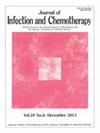Prophylactic oral antibiotic bowel preparation for colorectal surgery in Japan: results of a nationwide questionnaire survey
IF 1.5
4区 医学
Q3 INFECTIOUS DISEASES
引用次数: 0
Abstract
Purpose
Surgical site infections (SSIs) incur a large burden in colorectal surgery. The importance of oral antibiotic bowel preparation (OABP) in SSI prevention has been affirmed; however, the current trends in Japan are unknown. This investigated bowel preparation practices among Japanese surgeons, focusing on OABP.
Methods
A nationwide online questionnaire was distributed to 456 surgeons from 412 institutions through the Japan Society for Surgical Infection.
Results
The rates of each bowel preparation protocol, mechanical bowel preparation (MBP) alone, MBP plus OABP, OABP alone, and no preparation, were as follows: 52.3 %, 43.1 %, 0.7 %, and 4.0 % for right-sided colon; 54.7 %, 44.2 %, 0.2 %, and 0.9 % for left-sided colon; 53.0 %, 46.2 %, 0.2 %, and 0.7 % for rectum; and 32.5 %, 66.0 %, 0.4 %, and 1.1 % for intracorporeal anastomosis, respectively. Combination of metronidazole and kanamycin was selected as oral antibiotic regimen in 88.1 % of respondents, and oral antibiotics were administered only on the day before surgery in 91.4 % of respondents, and this method was introduced within the last 10 years. Factors associated with OABP usage were performing over 100 colorectal cancer surgeries per year, colorectal specialization, intracorporeal anastomosis, and lower self-reported SSI rates. Although there was no significant difference, only 25 % of respondents of younger surgeons (within 10 years of the career of surgery) used OABP.
Conclusions
Nearly half of surgeons routinely use OABP, and its adoption has grown over the past decade, although it remains less prevalent in Japan than in the United States. These finding may help optimize perioperative strategies and improve colorectal surgery outcomes in Japan.
日本结直肠手术预防性口服抗生素肠道准备:一项全国性问卷调查结果。
目的:手术部位感染(ssi)是结直肠手术的一大负担。口服抗生素肠道准备(OABP)在预防SSI中的重要性已得到肯定;然而,日本目前的趋势尚不清楚。本研究调查了日本外科医生的肠道准备实践,重点是OABP。方法:通过日本外科感染学会向全国412家机构的456名外科医生发放在线问卷。结果:各肠准备方案、单独机械肠准备(MBP)、MBP + OABP、单独OABP和不准备的比例分别为:右侧结肠52.3%、43.1%、0.7%和4.0%;左侧结肠54.7%、44.2%、0.2%、0.9%;直肠53.0%、46.2%、0.2%、0.7%;体内吻合率分别为32.5%、66.0%、0.4%、1.1%。88.1%的应答者选择甲硝唑联合卡那霉素为口服抗生素方案,91.4%的应答者仅在手术前一天口服抗生素,且该方法是近10年内引进的。与OABP使用相关的因素包括每年进行超过100例结直肠癌手术、结直肠癌专业化、体内吻合术和较低的自我报告SSI率。虽然没有显著差异,但只有25%的年轻外科医生(手术生涯10年内)使用OABP。结论:近一半的外科医生常规使用OABP,在过去的十年中,它的采用有所增加,尽管它在日本的流行程度不如美国。这些发现可能有助于优化围手术期策略和改善日本结直肠手术的结果。
本文章由计算机程序翻译,如有差异,请以英文原文为准。
求助全文
约1分钟内获得全文
求助全文
来源期刊

Journal of Infection and Chemotherapy
INFECTIOUS DISEASES-PHARMACOLOGY & PHARMACY
CiteScore
4.10
自引率
4.50%
发文量
303
审稿时长
47 days
期刊介绍:
The Journal of Infection and Chemotherapy (JIC) — official journal of the Japanese Society of Chemotherapy and The Japanese Association for Infectious Diseases — welcomes original papers, laboratory or clinical, as well as case reports, notes, committee reports, surveillance and guidelines from all parts of the world on all aspects of chemotherapy, covering the pathogenesis, diagnosis, treatment, and control of infection, including treatment with anticancer drugs. Experimental studies on animal models and pharmacokinetics, and reports on epidemiology and clinical trials are particularly welcome.
 求助内容:
求助内容: 应助结果提醒方式:
应助结果提醒方式:


